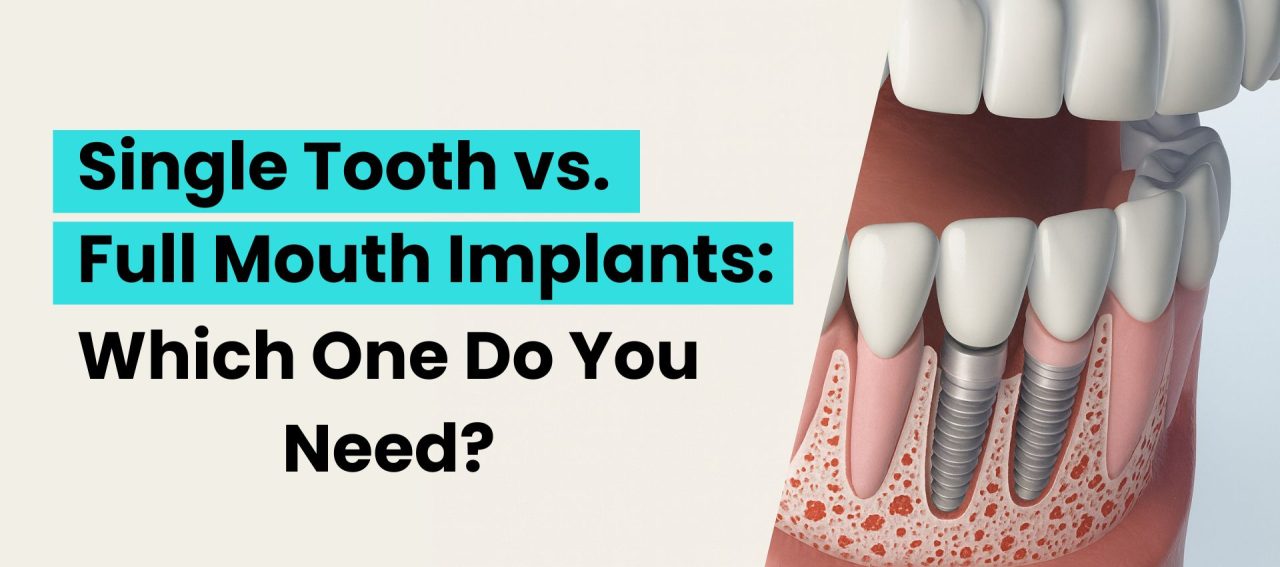If you really want to replace your missing teeth, then dental implants are the premium option, which help you regain your teeth’s strength. But one question that confuses many patients is this:
Do I need a single tooth implant, or is full mouth restoration the right choice for me?
Here at Cusp Dental Clinic, we understand that every smile is different—and so is every solution. Whether you’ve lost one tooth due to an accident or need a complete oral rehabilitation, we offer tailored implant plans designed to restore both confidence and function.
In this blog, we break down the differences between single tooth implants and full mouth implants—so you can make an informed decision that fits your dental health, budget, and long-term goals.
What Are Dental Implants?
Before diving into the types, let’s briefly understand what implants are.
A dental implant is a titanium post that acts as a replacement for the root of a missing tooth. It is surgically placed into your jawbone and supports a crown, bridge, or denture to restore the visible part of the tooth.
✅ Key benefits:
- Looks and feels like natural teeth
- Prevents jawbone loss
- Long-lasting and stable
- Supports surrounding teeth and facial structure
Also read: Best Dental Implants in Gurgaon
What Is a Single Tooth Implant?
A single tooth implant is used to replace one missing or damaged tooth. It involves:
- One titanium post placed into the jaw
- One abutment (connector)
- One custom-made crown
This is ideal when:
- You’ve lost a tooth due to decay, trauma, or extraction
- Adjacent teeth are healthy
- You are finding a long-term solution that looks and feels natural
🧠 Cusp Tip: We recommend single implants for patients who want to preserve jaw health and avoid compromising nearby teeth (as with bridges).
✅ Best for: 1–3 missing teeth with good bone support
What Are Full-Mouth Implants?
Full mouth implants, or full-arch implants, are used when you’ve lost all or most teeth in your upper or lower jaw.
This technique typically involves:
- 4–8 implants per arch
- A fixed prosthetic bridge or denture attached to the implants.
- Complete smile and bite restoration
At Cusp Dental Clinic, we often use All-on-4 or All-on-6 protocols, depending on your bone structure, smile goals, and budget.
✅ Best for: Patients with extensive tooth loss or failed bridges/dentures who want a permanent, stable solution.
Comparing the Two: Key Differences
| Feature | Single Tooth Implant | Full Mouth Implant |
| Number of Implants | 1 | 4–8 per arch |
| Time Required | 1–2 appointments | Multiple stages |
| Cost | Lower (per tooth) | Higher (overall) |
| Recovery Time | Shorter | Longer |
| Function | Replaces one tooth | Replaces full bite |
| Longevity | 15–25+ years | 15–25+ years |
🧠 Note: Full mouth implants may offer more value per tooth in complex cases.
How to Decide Which Is Right for You
1. Number of Missing Teeth
- 1–2 teeth missing = go for single tooth implants
- 4 or more missing teeth = consult about full arch restoration
2. Oral Health Condition
- Healthy gums and strong jaw = suitable for single implants
- Multiple decayed or mobile teeth = full mouth may be better
3. Bone Density & Volume
At Cusp, we conduct 3D digital scans to assess bone availability. If you’ve had bone loss, we may recommend:
- Bone grafting
- Zygomatic implants (in complex cases)
- All-on-4 with angulated implants
4. Budget Considerations
Single implants are less expensive upfront, but multiple single implants can add up. Full-arch solutions like All-on-4 provide better value when replacing many teeth.
5. Function and Lifestyle
- Do you struggle with chewing or speaking clearly?
- Do you want to avoid removable dentures?
Full mouth implants offer a permanent, confident solution—often improving nutrition, speech, and self-esteem.
The Cusp Dental Implant Process
No matter which type of implant you need, our process at Cusp Dental Clinic is designed for comfort and precision.
Step-by-step:
- Consultation & Scan – Digital imaging, jaw analysis, and treatment planning
- Implant Placement – Painless procedure with sedation options
- Healing Period – Osseointegration (3–6 months)
- Prosthetic Attachment – Crown for single tooth / bridge or denture for full mouth
- Follow-up Care – We guide you through oral hygiene and check-ups
Related blog: Dental Implant Surgery: Tips for Recovery and Managing Side Effects
Benefits of Dental Implants at Cusp Dental Clinic
- Personalized Treatment Plans – Every case is unique and deserves a tailored approach
- Advanced Technology – 3D scanning, in-house lab, and guided surgery
- Comfort-First Dentistry – Sedation available for nervous patients
- Natural-Looking Results – We use high-quality zirconia or ceramic crowns
- Long-Term Care – From planning to post-op, we’re with you every step
Real Patient Feedback
“I got a single implant at Cusp for a front tooth. It looks so natural—no one can tell it’s not real!” – Priya S., 31
“After years of dealing with loose dentures, I finally went for full mouth implants at Cusp. The difference is life-changing.” – Mr. Raghavan, 60
Final Thoughts: Your Smile Deserves the Right Solution
Choosing between a single tooth implant and a full mouth restoration isn’t just about number of teeth—it’s about restoring function, confidence, and joy.
At Cusp Dental Clinic, our team will help you make the best choice based on your smile, health, and lifestyle.
Because whether it’s one tooth or an entire arch—every smile deserves a second chance.


